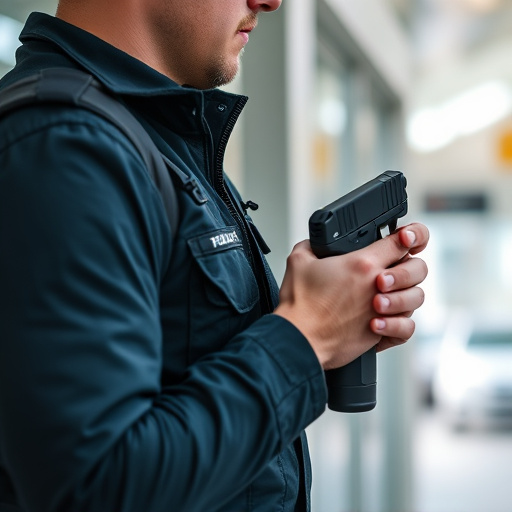The legal framework for defense gear varies greatly globally, with "self-defense" definitions and product regulations differing significantly by region. This encompasses strict rules on purchasing, possessing, carrying, and using tools like pepper spray and firearms, including age limits, background checks, storage requirements, and guidelines on proportional force. Individuals must thoroughly research local self-defense laws before equipping themselves for safety, as these legal considerations vary widely. Understanding self-defense product laws is crucial for balancing individual rights with public safety, ensuring compliance, and effectively protecting oneself and loved ones.
Understanding the laws surrounding self-defense equipment is paramount for individuals seeking to protect themselves. This comprehensive guide delves into the intricate world of self-defense product laws, exploring legal definitions and regulations at local, state, and federal levels. We dissect the legality of various defense gear, highlight rights and responsibilities, and navigate the complex landscape of defense product regulations. By understanding these legal aspects, citizens can ensure they remain within the boundaries of the law while protecting themselves and their loved ones.
- Self-Defense Product Laws: An Overview of Legal Definitions and Regulations
- Understanding the Legality of Defense Gear: A Deep Dive into Permitted Use
- Legal Considerations When Carrying Defense Tools: Rights vs. Responsibilities
- Navigating Defense Product Regulations: Local, State, and Federal Guidelines
Self-Defense Product Laws: An Overview of Legal Definitions and Regulations

The legalities of defense gear vary significantly across jurisdictions, reflecting complex self-defense product laws and regulations. Understanding these legal considerations is crucial for anyone considering carrying or using tools designed for personal protection. The definition of “self-defense” itself can differ from state to state, with some regions adhering to strict “stand your ground” policies while others mandate the use of force be proportional to the perceived threat.
Defense products, ranging from pepper spray and stun guns to concealed firearms, are subject to stringent regulations. These laws often dictate who can purchase and possess such items, where they can be carried, and under what circumstances they may be used. Factors like age restrictions, waiting periods, background checks, and storage requirements vary widely, underscoring the need for individuals to thoroughly research local self-defense product laws and regulations before equipping themselves for personal safety.
Understanding the Legality of Defense Gear: A Deep Dive into Permitted Use

Understanding the legality of defense gear is a crucial step for anyone considering armed self-defense. The laws surrounding self-defense products vary greatly from one jurisdiction to another, making it essential to know what’s permitted and where. Self-defense product laws and regulations are designed to balance individual rights with public safety, dictating when and how certain defensive tools can be carried or used. From pepper spray to stun guns and even firearms, each type of self-defense gear comes with its own set of legal considerations.
When navigating the legalities of defense gear, it’s crucial to understand the specific rules in your location. Some areas have strict limitations on the types and quantities of self-defense products that can be possessed, while others may allow a wider range under certain circumstances. Additionally, the permitted use of these tools is often nuanced, with laws detailing when they can be employed for self-defense, defense of property, or other recognized situations. Staying informed about these regulations not only ensures compliance with the law but also empowers individuals to protect themselves and their loved ones effectively.
Legal Considerations When Carrying Defense Tools: Rights vs. Responsibilities

When considering the use and carriage of self-defense products, understanding the legalities involved is paramount to ensuring compliance with local laws and regulations. The self-defense product laws vary significantly across jurisdictions, governing not only what types of devices are permissible but also where and how they can be used and carried. It’s crucial to recognize that while your right to self-defense is protected, there are corresponding responsibilities to use such products responsibly and within legal boundaries.
The legal aspects of carrying defense tools encompass a range of factors, including personal safety, public safety, and the potential for misuse or abuse. Authorities often have specific guidelines regarding the types of self-defense gear allowed, their capacity (e.g., number of rounds in a firearm), and where they can be stored or carried (publicly or privately). Adhering to these defense product laws and regulations is not only a legal requirement but also demonstrates respect for the safety and well-being of your community.
Navigating Defense Product Regulations: Local, State, and Federal Guidelines

Navigating the legal landscape surrounding self-defense products is crucial for anyone considering purchasing or carrying such gear. Self-defense product laws vary significantly from one jurisdiction to another, encompassing local, state, and federal guidelines. Understanding these regulations is essential to ensure compliance and avoid legal repercussions.
At the local level, cities and counties may have specific rules regarding the types of self-defense tools allowed, their usage, and where they can be carried. For instance, some areas might restrict or ban certain weapons like tasers or pepper spray. State laws further elaborate on these restrictions, dictating permit requirements for carrying concealed firearms and establishing age limits for purchasing certain defense gear. Simultaneously, federal laws provide a broader framework, such as those governing the sale and possession of firearms across state lines. Knowing and adhering to these self-defense product laws is paramount for responsible citizens seeking to protect themselves.






